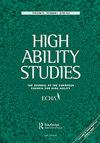自我调节学习:当前的裂缝、挑战和未来的研究方向
IF 1.3
4区 教育学
Q2 EDUCATION, SPECIAL
引用次数: 14
摘要
在《高能力研究》专刊的最后一章和评论中,我将重点关注资优、高能力和有天赋的学生的自我调节学习(SRL),并对未来在自我调节学习领域的理论、方法、研究和应用提出一些有希望的挑战和方向。我关注的是学生,尤其是有天赋/高能力/有天赋的学生。我首先讨论了在SRL概念化和建模方面需要进行的研究,包括为SRL和同源变量构建一致的命名法;为SRL及其组成部分建立一个易于处理的概念基础;建立更精细的模型。然后,我将继续讨论与抽样、测量、研究设计和分析有关的方法上的缺陷和缺点。接下来,我指出了一些需要实质性研究的领域,如绘制SRL的规律网络,识别SRL过程中的不同元素,探索SRL与环境之间的相互作用,检查SRL的发育差异,以及进一步研究个体差异。最后,我指出了SRL领域中一些有前途的应用方向。本文章由计算机程序翻译,如有差异,请以英文原文为准。
Self-regulated learning: Current fissures, challenges, and directions for future research
ABSTRACT In this closing chapter and commentary to the special issue of High Ability Studies focusing on self-regulated learning (SRL) in gifted, high ability, and talented students, I delineate a number of promising challenges and directions for future theory, methodology, research, and applications in the domain of self-regulated learning. I focus on students, in general, and gifted/high ability/talented students, in particular. I begin by discussing needed research in conceptualizing and modeling SRL, including constructing a consistent nomenclature for SRL and cognate variables; developing a tractable conceptual foundation for SRL and its components; and building models that are more refined. I then move on to discuss methodological fissures and shortcomings pertaining to sampling, measurement, and research design and analyses. I continue by pointing out some needed substantive areas of research, such as mapping out the nomological network of SRL, identifying distinct elements in the SRL process, exploring interactions between SRL and context, examining developmental differences in SRL, and further study of individual differences. Finally, I point out a number of promising directions for applications in the realm of SRL.
求助全文
通过发布文献求助,成功后即可免费获取论文全文。
去求助
来源期刊

High Ability Studies
Multiple-
CiteScore
4.80
自引率
11.10%
发文量
7
期刊介绍:
High Ability Studies provides a forum for scholars in a variety of disciplines associated with the development of human abilities to their highest level. It is a medium for the promotion of high ability, whether through the communication of scientific research, theory, or the exchange of practical experience and ideas. The contents of this journal are unique in reflecting concerns and recent developments in this area from childhood and across the whole life span in a variety of contexts. Far from being restricted to the traditional focus on high-level cognitive development, it also presents investigations into all other areas of human endeavour, including sport, technology, the arts, business, management and social relations.
 求助内容:
求助内容: 应助结果提醒方式:
应助结果提醒方式:


